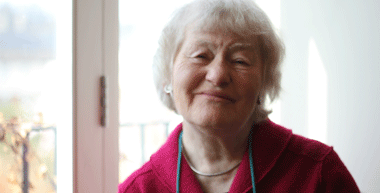
In the fifth and final part of our exclusive series, Bridget, 69, an oral historian who helped her father record his experiences of diabetes in the late 1920s, talks about living with diabetes and how her father’s legacy still influences her today.exclusive series
"I was diagnosed with Type 1 diabetes in 1952 at the age of nine. I’m on one daily injection - a combination of slow acting and fast acting bovine insulin.
My father (pictured below with his second wife Gladys and me in the early 1990s), taught me ‘to be my own doctor’, which is what he was told way back in the late 1920s when he was first diagnosed with diabetes. He taught me to understand what happens in the body when you are diabetic and how the subtle balance of insulin and food is so important to understand.
Because I’m on only one injection of insulin a day, I’m very meticulous about working out how much insulin I need in order to absorb the amount of carbohydrates I’m eating. People think it’s black and white, but it varies from day-to-day and I’m constantly trying to work out a balance. For example, when I travel my blood glucose sometimes goes up and down, or if I’m writing an article and I feel tense, my levels fluctuate. I find that people don’t always find that easy to understand.
As long as I’m doing all the right things, I can trust my body to warn me when I’m about to go hypo. If I wake up in the middle of the night it’s usually because my blood sugar is low so I have something sweet to eat. I always have something ready by the side of my bed because I know full well I’ll be confused when my blood glucose goes low, and while the seconds are passing I could be lying unconscious. I also have some Maltesers around the house because they are small and a quick fix, so when I feel my blood sugar level dropping I just pop one or two in my mouth.

Eating my own food means I know what’s going on inside my body and how my body will react to it. I have a quarter of an allotment and grow all sorts of things; at the moment I have purple sprouting broccoli which is absolutely delicious.
Apart from enjoying growing and eating my own food, I like the community of an allotment. We can have cups of tea there in the mornings - it’s a wonderful place to enjoy other people’s company.
Although healthy food is very important, I also think it’s vital to treat yourself every now and again. Diabetes can be tough and you need something to look forward to – likewise it’s important to have people around you to support you and appreciate it’s not always easy.
When I go away to France with friends, I say to them for every cake you have I’ll have one of those really delicious ripe peaches. I develop these strategies at home too and I’ll usually have a collection of special foods for when I want a treat. I feel strongly you shouldn’t deprive yourself of little food treats like that.
I am a firm believer that diabetes doesn’t need to restrict you; it’s possible to always find a way around a problem. For example, when I travelled to a hot country, I kept my insulin cool in a thermos flask. If I go to a restaurant and I need to do a blood test, I’ve developed a technique of doing it under the table so people don’t notice or ask questions or I just go to the toilet and do the test.
Although I’m pretty healthy for my age, I’ve got an Implantable Cardioverter Defibrillator (ICD) device near my heart. It’s essential I do regular exercise. I travel into London fairly often, and live three-quarters of a mile from the station and I did get in the habit of taking a taxi home from the station. So I made a rule for myself to aim to walk to and home from the station unless it is very late or pouring with rain. Now, I often walk there and back because I feel energised from the exercise. If you feel better about yourself, the whole world seems a wonderful place.
I’ve learned a lot from being diabetic. I’ve learned to structure my life and be assertive. Whatever it is, I think how can I manage that? It’s encouraged me to use my lateral thinking and I don’t think it has ever stopped me doing anything. Diabetes might make things awkward or difficult to do, but not impossible.
My father was a great believer in living life to the full - he was determined to spread the message that you can live a long and active life with diabetes. He did ,until he was 90. It is because of his guidance and unyielding support that I am proving him right.
However, the most important thing he gave to me was that ‘I should be my own doctor’ This is something I think is missing in healthcare today. Teaching people to be independent and to understand their condition and be responsible for it. Each diabetic is an individual and needs to be treated differently from the next . The best person to understand that is yourself."
If you missed any instalments of ourfive-part serieson Bridget Wilkins and her father Jim, you can catch uphere.
